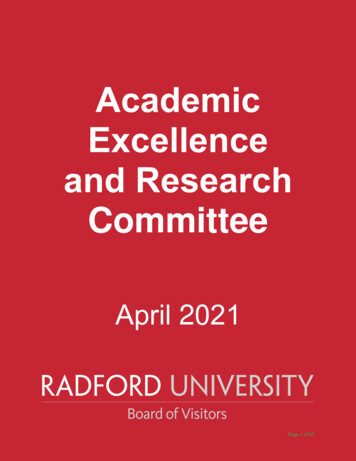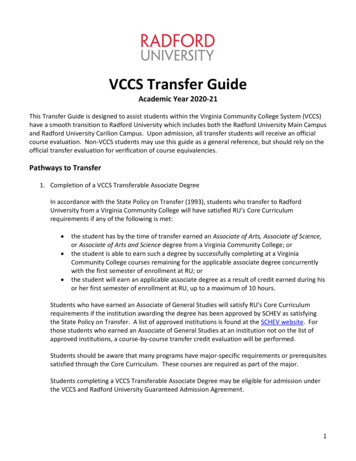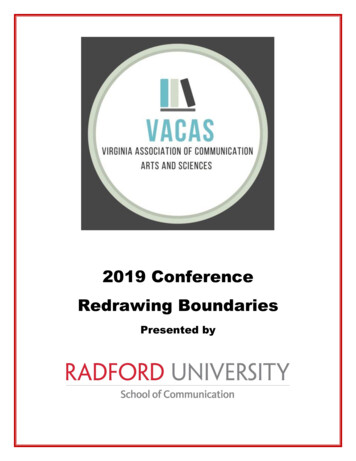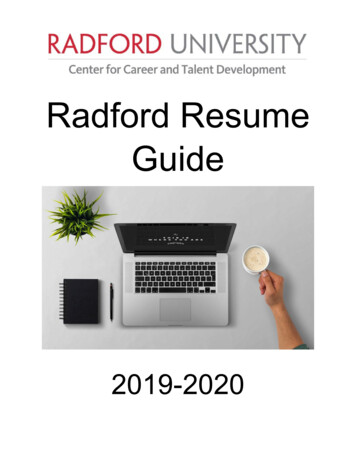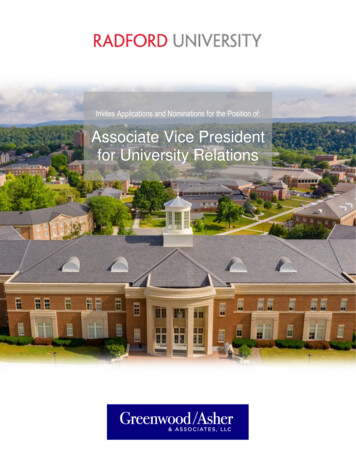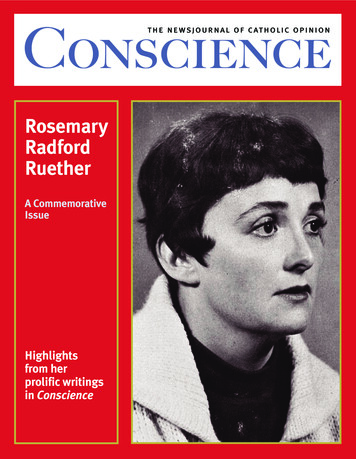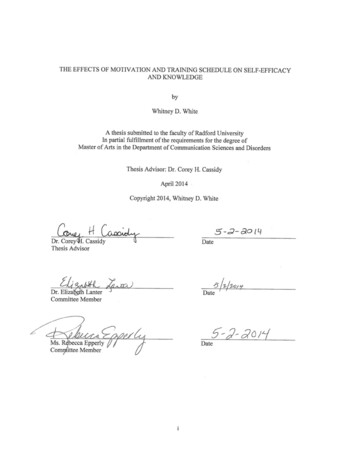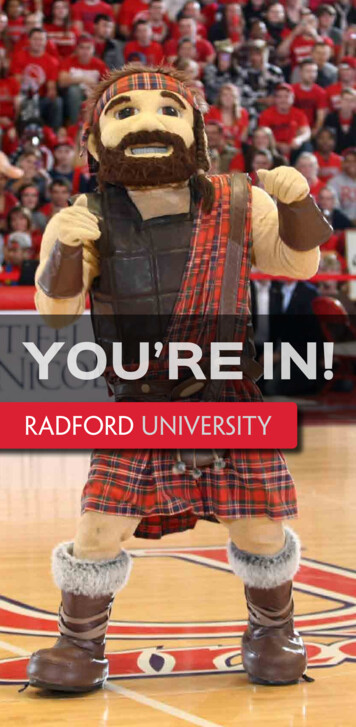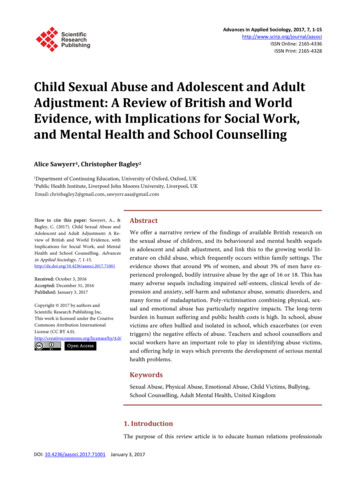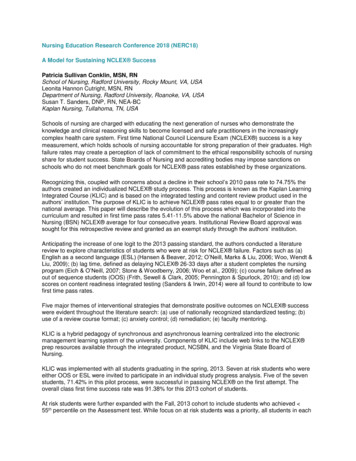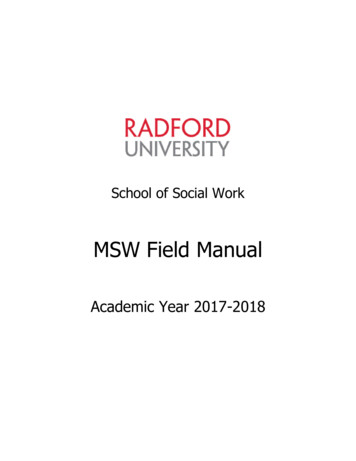
Transcription
School of Social WorkMSW Field ManualAcademic Year 2017-2018
Table of ContentsPart D: Field Education . 1Welcome .1The Field Program.1Field Policies and Procedures .2Admission to Field Instruction Program . 2Placement Process . 2Field Agencies. 4MSW Supervision . 5Roles and expectations . 6Foundation Practicum (SOWK 641/642) .9Concentration Practicum (SOWK 791/792) .9The Learning Agreement . 10Process . 10Roles (in preparing the learning agreement) . 10Completion . 11Copies. 11Revisions . 11Evaluation Process. 11Midterm and Final evaluation . 11Additional Policies . 12Transportation . 12Dress Code . 12Documentation . 12Certification of Hours. 12Assigning Grades/Attending Seminars . 12Grading Policy . 12Field Placement Disruption. 13Calendar . 13Field Hours. 13Internship and Related Travel. 14Student Confidentiality Waiver . 14Liability Insurance . 14Block Placements . 14Changing Placements . 15Field Instruction with Current or Former Employer. 16
PART D: FIELD EDUCATIONWelcomeOn behalf of Radford University and the School of Social Work, I welcome you to the fieldeducation component of our program. The Council on Social Work Education has declared fieldas the signature pedagogy of social work education, underscoring the importance of universitycommunity partnerships that allow students to reinforce and apply the knowledge they havelearned in the classroom. The Field Education Manual serves as a guide for students, fieldeducators, agencies and faculty as they endeavor to provide a sound educational foundation forthe field experience. This edition of the manual has been developed to reflect the most currentpolicies and procedures of the School of Social Work.Since 1974 Radford University has been a leading force in preparing students for careers asprofessional social work practitioners and we have developed professional relationships thatconnects faculty, students and practitioners. We wish to acknowledge and thank all of theagencies, field instructors, task supervisors, faculty and students whose contributions, sacrificesand personal commitments to social work continue to make social work field education atRadford University a success.I welcome suggestions on ways to enhance the field education program.In advance I thank each of you for your collaborative spirit and look forward to a positive andproductive academic year.Beth Deskins, MSWField CoordinatorThe Field ProgramThe field education process makes classroom learning "come alive" by providing students withopportunities to apply theories and processes discussed in class to real life situations. It is acentral and pivotal component of the MSW curriculum. Through the practicum students applyand integrate the knowledge and skills imparted in classes. A range of learning opportunitiesfacilitates students in applying theories and skills within a supervised environment.The Goals and Objectives of the MSW program are essential to the field educationcomponent. Final evaluation is based on these program goals, found in Part A of the MSWStudent Handbook.1
Field Policies and ProceduresAdmission to Field Instruction ProgramStudents must meet all of the following requirements in order to be admitted to the fieldinstruction program.1. Completion of all prerequisite courses in accordance with academicperformance requirements set forth in the Graduate Catalog and the MSWStudent Handbook.2. Concurrent enrollment in required practice courses.3. Completion of field application and other required documents and interviewwith Field Coordinator.4. Attendance at Field Internship Fair to talk with agencies about internshipopportunities.5. Successful interview with their potential Field Instructor to confirm theirplacement.6. Secure professional liability insurance, in the amount of 1 million/3 million, priorto the beginning of field placement.7. Attend all required field orientations and meetings.8. Submission of all required field paperwork.9. Continued demonstration of field readiness in accordance with academic andprofessional standards set forth in the Graduate Catalog, Waldron CollegeStandards of Professional Practice Education, MSW Student Handbook, andNASW Code of Ethics.Placement ProcessField instruction allows students to build on their previous work experiences as well as on theirclassroom work. Placement for field experience is an individualized process, but includes certainnecessary steps. Those steps are:1. Student completes a Field Placement Application and uploads application to theD2L class that has been designated for the particular field cohort one semesterprior to placement. Applications are found in the D2L class and on the School ofSocial Work’s website. If a student plans to submit an employment basedproposal, the cover form available on D2L and the website, must beaccompanied with the field application.2
rk/academicprograms/field-program.htmlFall placement – Due second Friday in FebruarySpring placement – Due first day of fall semesterSummer placement – Due first day of spring semester2. The student is interviewed by the Field Coordinator to discuss the fieldplacement process and required documents and forms. Discussion aboutinternship sites available that will maximize the learning experience for thestudent.3. Student applies for and purchases liability insurance in the amount of 1million/ 3 million.4. An internship fair is scheduled to provide the student with an opportunity totalk with agencies interested to host an intern, to determine learningexperiences for the students. Once a match has been made, the student iscontacted regarding the future process, (Additional interview, nothingadditional, etc.) Should an interview be requested by the agency, upon receiptof contact information for the agency, the student is to make contact andschedule an interview within 3 business days.5. Incoming full-time MSW students who plan to begin field placement in fallsemester must be available to interview face-to-face with a field placementagency on or before July 30. If students are not available on or before July 30,students will not be eligible to begin a field placement in fall semester.6. The student is interviewed by an agency representative and is selected. If theagency requests an additional interview, by the close of that business dayfollowing that interview, the student is to make contact with the FieldCoordinator to indicate their interest in continuing to explore an internshipopportunity with the agency. (Agencies may reject a student if there is not amutually agreeable fit.)7. The student is assigned to an agency Field Instructor (and Task Supervisor, ifapplicable).8. Incoming students should receive their assigned placement by the end of Julyfor placements to begin at the end of August. Current students should receivetheir assigned placement by the end of the preceding semester. A confirmationletter regarding the placement will be sent to the student and the placementagency.3
9. As soon as students receive the placement, the student will make contact withthe prospective Field Instructor (or Task Supervisor) to coordinate schedulesand discuss pre-placement requirements, including background checks.Every student will be offered an interview with a field placement agency. If the FieldCoordinator, in consultation with the field agency, determines the interview at the first agency isnot successful, the student will be granted a second interview at a second agency. However, theField Coordinator may refer the student for advising to develop a remediation plan before thissecond interview. If the second interview is determined unsuccessful by the Field Coordinator,in consultation with the field agency, then the student will be referred to the Field Committee.Failure to successfully interview a second time may result in a recommendation of dismissalfrom the BSW/MSW program and will be referred to the BSW/MSW Committee for furtheraction.Field AgenciesSelectionStudents in the field practicum program are placed in human service agencies under public orprivate auspices. Either an agency or the Radford University School of Social Work may initiatethe procedures designating an agency as a field instruction site. The Field Coordinator and theagency executive negotiate a working agreement based on the criteria stated below. If the FieldCoordinator and the agency executive successfully negotiate a working relationship, a writtenstatement of this agreement is sent to the appropriate agency representative. The agreement issigned by the Field Coordinator, the appropriate agency representative (or his/her designatedrepresentative), the Director of the School of Social Work and Radford University’s Director ofProcurement and Contracts.Field Placements are located within 90 miles of their primary RU campus, Roanoke or Radford.Students are required to attend field seminar meetings face to face. Requests for placementsoutside of the 90-mile radius, including specialized placements, can be made to the FieldCommittee in the form of a petition one semester prior to the start of the field placement. Thispetition will be presented to the Field Committee that will make the final decision regarding theapproval/disapproval of the petition. In addition to meeting requirements for field placementagencies, the agency field instructor must have access and willingness to use various forms ofdistance technology. Students are required to attend field seminar meetings face to faceCriteriaAll field instruction sites must meet the following criteria:1. The agency's philosophy, goals, programs, and policies are compatible withprofessional social work standards.4
2. The agency board, administrator, and staff are committed to the field instructionprogram, its goals and objectives, and due process protection of students as asignificant function and responsibility of the agency. The agency agrees to supportthe academic mission of field placements. This includes providing the student witha qualified Field Instructor (or Task Supervisor).3. The agency administrator and staff are willing to cooperate with the university inplanning for supervision and evaluation of placed students. The agency FieldInstructor (or Task Supervisor), is expected to attend field orientations and at leastone field academy per academic year.4. The agency is in good standing in the community. It qualifies for membership inthose standard-setting bodies - national, state and local - appropriate to its field ofpractice.5. The agency's staff is large enough to maintain and develop its basic programwithout reliance on students.6. The agency should provide the student with amenities to fulfill their duties as anintern, according to the NASW Code of Ethics and the Waldron College Standards ofProfessional Practice.MSW SupervisionA Field Instructor should be regularly accessible within the agency where the student is placed.If the immediate agency supervisor does not hold a social work degree, then another personwith social work credentials will be asked to provide social work supervision. Supervisoryconferences should last at least one hour and be scheduled on a weekly basis. Learning isenhanced when supervision is frequent and consistent. During the field orientation prior to thefield placement, the student will receive information on the supervisory process. This willinclude: getting the most out of supervision requires that you know what supervision is, how touse the supervisory relationship, and what specific actions on your part facilitate effectivesupervision.Approval of the proposed Field Instructor rests with the School of Social Work. The minimumrequirements for serving as a Field instructor for a foundation year graduate student is to hold aMSW degree from an accredited institution and two years of post-MSW practice experience.The minimum requirements for serving as a Field instructor for a concentration year graduatestudent is to hold a MSW degree from an accredited institution and three years of post-MSWdirect practice clinical experience or be a Licensed Clinical Social Worker.If a qualified Field Instructor is not available in the agency, a Task Supervisor is identified to workwith the student in the agency and the School of Social Work, in collaboration with the agencyand the student, appoints a qualified Field Instructor to provide the weekly educationalsupervision.5
Roles and expectationsField OrientationA mandatory orientation for all MSW students, Field Instructors, Task Supervisors, and FacultyField Liaisons is scheduled prior to the start of the semester. The purpose of this orientation isto educate the student and agency on the policy and procedures of the field education program.Roles and responsibilities, along with policy guidelines and ethical decision making will also bediscussed to better assimilate the student to the culture of the social work profession.StudentA LiveText membership is required of students enrolled in a field practicum and seminar class aspart of the professional education curriculum of the social work program. The field internshipexperience requires the use of LiveText for submitting evaluations and other documentation.It is the responsibility of the Faculty of the School of Social Work to communicate and monitorstandards of professional and ethical behavior. Students will, at all times, be familiar with andadhere to the Waldron College Standards of Professional Practice Education, the NationalAssociation of Social Workers’ Code of Ethics and the policies of Radford University and theSchool of Social Work. Failure to adhere to these standards will result in a student being deniedentry into the field component of the MSW program or in dismissal from the MSW program, asdescribed under “Retention in the MSW Program” in the MSW Student Handbook.While the Field Coordinator, the Field Instructor (and Task Supervisor, if applicable) and theFaculty Field Liaison work to provide a quality field instruction experience for students, thestudent is expected to fulfill a number of responsibilities. In addition to the requirementsdescribed above under “Placement Process”, these responsibilities also include responsibilitiesrelated to the agency experience.Once the student begins the field placement, the student1. Reviews any policies and procedures related to personal work while accruinginternship hours. Students must receive permission from field instructor/tasksupervisor anytime the student will engage in personal work (academic work, socialmedia, etc.).2. Has agency expectations made clear, is prepared for and receives supervision on aregular basis, is actively involved in the social work tasks of the field setting, andparticipates in the evaluation process;3. Acts as a mature, professional person at the assigned agency. The NASW Code ofEthics is used as one criterion for determining professional conduct;4. Maintains confidentiality on matters pertaining to clients;5. Arranges for transportation to and from the agency and, when necessary, arrangesfor off-campus living accommodations;6. Negotiates with the agency Field Instructor and Task Supervisor, if applicable alearning agreement at the beginning of the placement;6
7. Notifies the agency Field Instructor or designee if the student must be absent fromthe field placement;8. Completes all written assignments satisfactorily;9. Participates in the field placement seminars held at the University;10. Prepares for and constructively uses supervisory conferences; and11. Arranges with the agency field instructor for the termination or orderly transfer ofcases or projects before leaving the agency.Faculty Field Liaison1. Attend field orientations and trainings;2. Monitor and assess agencies, Field Instructors, Task Supervisors and students'learning experiences including the review and approval of the student’s learningagreement;3. Assist students with the integration of course work and practicum;4. Assist Field Instructors with developing teaching skills and providing them withcourse outlines and other materials;5. Assist in resolving problems between students and Field Instructors or other agencyissues;6. Meet with the student and the Field Instructor and/or Task Supervisor, a minimumof three times during the academic semester (two meetings are required to be inperson, face to face, recommend one visit be in the beginning with the learningagreement and the second visit be at the final evaluation) (For block placement, atotal of 3 agency visits, - 2 visits completed in SOWK 641 and 1 visit completed inSOWK 642 for 3 total visits an academic year) – based on an assessment of theplacement and in consultation with the Field Coordinator, it may be determined thatonly one of the three contacts the second semester needs to be on-site and face-toface;7. Assign the student a grade at the end of the semester;8. Coordinate and facilitating the field placement seminar;9. Facilitate the completion of learning agreements, midterm and final evaluations;10. Complete field administrative paperwork in a timely fashion; and11. Ensure communication between the Task Supervisor and the Field Instructor if aTask Supervisor is utilized.Field Instructor1. Abide by NASW Code of Ethics and support the Waldron College Standards ofProfessional Practice and the Radford University Standards of Student Conduct.2. Cannot be a current student in the School of Social Work of Radford University.3. Serve as a Field Instructor for any given student a maximum of one placement.4. Monitor the student’s learning experience, ensuring that the experience iseducational in nature,5. Participate in carrying out the educational objectives of the field instructioncurriculum,6. Assist in the development of the learning agreement.7. Provide a range of appropriate practice experiences aimed at the student’sprofessional growth,8. Provide a minimum of one hour of one-to-one or group supervision per week,7
9.10.11.12.13.Consult with the Faculty Field Liaison a minimum of three times per semester,Engage in telephone consultation when necessary,Provide an orientation for field students,Attend field instruction seminars at the University (CEU’s offered)Provide input into the ongoing development of the School’s curriculum andprogram,14. Complete required paperwork in a timely manner.Task Supervisor (if applicable)1. Abide by NASW Code of Ethics and support the Waldron College Standards ofProfessional Practice and the Radford University Standards of Student Conduct.2. In consultation with Field Instructor, monitor the student’s learning experience,ensuring that the experience is educational in nature,3. Participate in carrying out the educational objectives of the field instructioncurriculum,4. Consult in the development of the learning agreement.5. In consultation with field instructor, provide a range of appropriate practiceexperiences aimed at the student’s professional growth,6. In consultation with Field Instructor, consult with the Faculty Field Liaison aminimum of three times per semester,7. Engage in telephone consultation when necessary,8. Provide an orientation for field students,9. Attend field instruction seminars at the University (CEU’s offered)10. Provide input into the ongoing development of the School’s curriculum andprogram,11. Complete required paperwork in a timely manner.Agency1. Interview a prospective field student and accepts or rejects a student.2. Consider the student for placement without respect to race, ethnic origin, gender,sexual preference, age, religion, disability (unless student is not able to function inthe agency setting with accommodations), or political belief.3. Designate a qualified Field Instructor and/or Task Supervisor, who has the majorresponsibility for structuring the student's learning experiences.4. Provide the Field Instructor and/or Task Supervisor with adequate time to carry outresponsibilities to the student.5. Advise the Faculty Field Liaison and/or Field Coordinator of policy and servicechanges in the agency.6. Provide necessary space and facilities (such as telephone, clerical services, andaccess to client records) for each student.7. Provide the student with transportation or mileage reimbursement for fieldassignments that take the student outside of the agency. If agency policies do notpermit this, the student is informed of this before the field assignment is accepted.8
Foundation Practicum (SOWK 641/642)205 hours in the field 18 hours seminar 223 hours per semester or 410 hours in the field 36 hours seminar 446 total)Students are required to intern in the respective agency at least two days per week.The two-semester foundation field practicum and supporting seminar provides a forum in whichstudents apply the knowledge, skills, and values acquired from the foundation curriculum todirect and macro practice. The concepts and theories of the generalist perspective are applied.An emphasis is placed on assessment and practice grounded in theory. The ecological andperson-in-environment theoretical frameworks provide a basis for entering into practice. Socialconstruction and empowerment theories help focus client interaction toward the use of practicemethods which respect “client” decision making. Practice is based on ethical decision making,valuing and respecting diversity, working toward the dismantling of oppression, and establishingsocial and economic justice.The focus is placed on assessment/analysis of client needs, client-worker relationships,professional values and ethics, service delivery issues, agency/organizational dynamics, andsocial work supervision. Practice at the micro, mezzo, and macro levels are incorporated and theapplication of the multiple practice methods introduced in SOWK 631 & 632 is encouraged. Thisis a practicum experience that utilizes a face-to-face seminar as the method of instruction.Concentration Practicum (SOWK 791/792)300 hours in the field 18 hours seminar 318 hours per semester or 600 hours in the field 36 hours seminar 636 hours totalStudents are required to intern in the respective agency at least three days per week.The two semester concentration practicum and supporting seminar provides a forum in whichthe knowledge, skills, and values acquired from the specialized concentration curriculum areapplied. The concepts and theories of community-based family practice (CBFP) are applied. Theskills and knowledge taught in SOWK 783 and 784 are applied through multiple environmentsand across the micro, mezzo, and macro levels. Service delivery issues, agency/organizationaldynamics, and practice skills are emphasized. This is a practicum experience that utilizes a faceto-face seminar as the method of instruction. The knowledge and skills for direct and macropractice with diverse populations are developed and applied, emphasizing the dismantling ofoppression and applying methods which work toward social and economic justice forpopulations at risk. The seminar supports the exploration of ethical decision making.9
The Learning AgreementThe learning agreement is a written plan that describes an individualized learning experiencethat is consistent with student interests and needs, school objectives, and agency resources. Thelearning agreement structures the student time in the agency and outlines responsibilities in thepracticum. It is a three-way agreement that involves the student, the Field Instructor and ifapplicable, the Task Supervisor (who suggests opportunities), and the Faculty Field Liaison (whoapproves the quality and quantity of objectives and opportunities). When writing the learningagreement, the student should consider together the skills that may develop, interventions,and/or populations to learn more about, and experiences that complement the classroomlearning or research interest.ProcessThe learning agreement template can be found on the School of Social Work website. Thefollowing information should be considered as you complete the learning agreement template.A.B.C.The first column of the template is a list of the practice behaviors. Thesecorrespond to the evaluation and cannot be modified.The middle column should include a description of the tasks and assignmentsthat the student will do in carrying out the educational objectives.The last column should identify methods to be used for evaluation of student’sperformance (e.g. supervisory conferences, process recording, video/audiotapes, analysis of student documents, direct observation, client feedback, coworker evaluations).All field placements must provide opportunities for students to work with diverse clientpopulations.Roles (in preparing the learning agreement)Student: Does a self-assessment/awareness activity to identify areas of interest and existingstrengths, and those areas in which new knowledge and skills can be developed; identifiesthe course educational objectives; assesses the agency, and the community foropportunities to accomplish the educational objectives. The student now has the neededinformation to write the learning agreement.Field Instructor/Task Supervisor: provi
policies and procedures of the School of Social Work. Since 1974 Radford University has been a leading force in preparing students for careers as professional social work practitioners and we have developed professional relationships that connects faculty, students and practitioners. We wish to acknowledge and thank all of the
